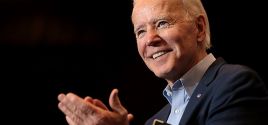Zombie Keynesianismby Michael S. RozeffNov. 20, 2010 |
Popular 
'This is Cruelty, This is Not War': Pope Francis Condemns Gaza Genocide in Christmas Message

Putin Accuses 'Ethnic Jews' of Tearing Russian Orthodox Church Apart

Biden Commutes Sentences of 37 of 40 Federal Death Row Inmates - Excludes Robert Bowers, Dylann Roof

U.S. 'Shoots Down Own Jet' Over Red Sea in 'Friendly Fire Incident'

Saudi National Rams Car Into Germans at Christmas Market in Suspected Terrorist Attack [UPDATED 2X]
 The Keynesians are having a highly public quarrel on a deep and divisive issue Ė a fundamental issue. They are wrangling over exchange rates. Obama and Bernanke and the U.S. Congress want the Chinese to raise the value of the Chinese currency. The Chinese donít want to. Both sides to this quarrel are Keynesians. Both states use the powers of the state to manage their economies through fiscal and monetary policies. This happens throughout most of the world. Keynesianism has brought the world to grief. State-controlled economies fail, as in the Soviet Union and Red China before 1978. The higher the degree of state control, the higher the degree of failure. The U.S. is experiencing the results of state control now. Its central bank has controlled the nationís money for years. The government has controlled the mortgage and housing markets for decades. Lately, it has run huge deficits in a futile attempt to end the recession created by its earlier mismanagement. The Keynesian quarrels actually show that the Keynesians donít know what they are talking about. Their politics and economics are both hopeless. Keynesianism is hopelessly flawed, wrong, inadequate, and unsuited to what is needed so that the planetís people can progress. Freedom and free markets are the prescription. The Red Chinese seem somehow to have found this out while the so-called bastion of so-called free enterprise remains mired down in Keynesianism. Keynesianism is an intellectually dead doctrine that still walks among us. What is Keynesianism? I quote Time magazine from its Dec. 31, 1965 issue. At that time, this magazine was a top mainstream media organ. It was a top voice of the establishment. It began by attributing economic progress that year to the adoption of a Washington-managed economy run on Keynesian principles: "In Washington the men who formulate the nation's economic policies have used Keynesian principles not only to avoid the violent cycles of prewar days but to produce a phenomenal economic growth and to achieve remarkably stable prices. In 1965 they skillfully applied Keynes's ideas Ė together with a number of their own invention Ė to lift the nation through the fifth, and best, consecutive year of the most sizable, prolonged and widely distributed prosperity in history."This attribution is a joke. In actuality, the Johnson administration was unleashing a guns and butter and social welfare and Medicare economy on America. It unleashed inflation. Prosperity was short-lived. In short order, six years to be exact, the U.S. defaulted on its international obligations and stopped redeeming dollars for gold. Consumer prices rose 29 percent between 1965 and 1971. The stock market went exactly nowhere between 1966 and 1982 in nominal terms and declined in real terms. A slowdown in the economy occurred in 1966. There were four recessions after and during these miraculous Keynesian interventions by the national government and central bank (Dec. 1969 to Nov. 1970, Nov. 1973 to Mar. 1975, Jan. 1980 to July 1980, and July 1981 to Nov. 1982.) Keynesianism came to grief as it always does and as it must. That does not mean that either its adherents or large masses of people reject it. They have been taught to believe, and they dutifully believe. Their faith wavers little. Our job is to shake that faith. Our job is to brand Keynesianism for what it is: a horrid doctrine that brings nothing but misery and grief. This takes a substantial marketing effort. Branding the existing Keynesian product as poisonous and replacing it with your own free market brand, that itself has been branded as poisonous by the Keynesians for decades, is a challenging task. We are up to it. Again, what is Keynesianism? According to Time: "Basically, Washington's economic managers scaled these heights by their adherence to Keynes's central theme: the modern capitalist economy does not automatically work at top efficiency, but can be raised to that level by the intervention and influence of the government. Keynes was the first to demonstrate convincingly that government has not only the ability but the responsibility to use its powers to increase production, incomes and jobs. Moreover, he argued that government can do this without violating freedom or restraining competition. It can, he said, achieve calculated prosperity by manipulating three main tools: tax policy, credit policy and budget policy. Their use would have the effect of strengthening private spending, investment and production."This is really a beautiful quotation. Something like this appears or has appeared in almost every textbook on macroeconomics. Something like this is what most people have been taught who have studied economics. Something like this is what most Keynesians believe is true. All of it is wrong. All of it is false. Every bit of it. The tragedy today is that the most highly-publicized arguments going on are about how states should manage economies, nationally and internationally. They are not about state-management itself, i.e., Keynesianism. The arguments getting the largest hearing and publicity are among devoted Keynesians. That reflects the doctrineís current dominance. Newsweek summed up the dominance of Keynesianism in its cover of Feb. 16, 2009: How did this come about? The Great Depression helped. Keynesians blamed this on free markets and offered a saviour. Who spread the religion? Time clues us in: "From Mischief to Orthodoxy. When Keynes first propagated his theories, many people considered them to be bizarre or slightly subversive, and Keynes himself to be little but a left-wing mischief maker. Now Keynes and his ideas, though they still make some people nervous, have been so widely accepted that they constitute both the new orthodoxy in the universities and the touchstone of economic management in Washington. They have led to a greater degree of government involvement in the nation's economy than ever before in time of general peace."The key factor is "new orthodoxy in the universities." The universities, by and large, propagate Keynesianism. If I may digress slightly, the very great and harmful influence of universities extends to many other departments and schools, such as law, journalism, public policy, and social work. The system of state-supported professions and universities has helped spread a variety of ills and plagues across America. This system should be a major target of libertarians and freedom-lovers of all stripes. Washington, of course, eagerly grasped this new orthodoxy. It was easy to lie by representing all economic successes as due to Keynesianism and all economic failures as due to other causes or to too low a degree of Keynesianism or to half-hearted or inept application of Keynesian principles by the opposing political party (see Paul Krugman or the New York Times for recent examples.) It got to the point where President Nixon, who supposedly was a Republican devoted to free markets, said that he was now a Keynesian in economics. That was after he ended any traces of the gold standard in international payments. And so we had political leaders of both major parties who were educating the American public to what Time said were once "subversive" ideas Ė and actually were and still are subversive ideas. In Timeís words, the capitalist economy fails to work: it needs government to work properly. Government has the capacity to do this, wrote Time. It had never read von Mises. It didnít know that socializing economies fails. The myth at the time was that Soviet Russia was a big success. The CIA said so. But, today in 2010, is there any valid excuse for the Keynesians to hang on to their doctrines? After all, these doctrines are logically false. They have been torn apart endlessly for years. They have been proven false again and again. The application of this falseness shows up in our suffering economy, and we can even pinpoint exactly why things have gone bad and where they have gone bad, as in the housing sector, and relate them back to the false Keynesian doctrines and their implementation by the national economic managers. There is no valid intellectual reason or argument to support Keynesianism, even if most economists or politicians still believe in it or give the public appearance of believing in it. Keynesianism is a zombie. Zombies are known, at least in Hollywoodland, to devour living flesh. Thatís what Keynesianism is still doing. Iíd rather see the Keynesians eat each other than eat us. But I fear the day that they mend their fences. Keynesianism will bring the world to even greater grief if the resolution of the Keynesian quarrels is a political accommodation that puts together a world central bank or that hammers out a world political authority to manage the worldís economy. Nothing would be worse than such outcomes. The zombie walks among us. Putting it down for good is overwhelmingly more important than taking sides in its family quarrel over exchange rates. If you must, then side with the Chinese. Their instincts are more correct, in this instance. The U.S. continually pestered Japan to appreciate the yen. Japan did so and this did nothing to rectify the trade imbalance with the U.S. All it did was depress the Japanese economy. The U.S. trade imbalance began to grow when the U.S. government deficits began to grow and when the Fed speeded up its printing presses. The Keynesians have patched together an international monetary system on unworkable principles, which is why these problems keep surfacing and why they are getting worse. The Europeans face a similar situation within their monetary union. Each time that the system fails, the Keynesians come up with new patches to keep it running. Itís clearly running on borrowed time. Itís only massive borrowing thatís keeping it going. And now the central banks are essential elements in absorbing the debts. I doubt very much that the Keynesians in charge realize how close they are to the cataclysm. Maybe thatís what it will take to convince everyone that Keynesianism is a failed doctrine. ___ Michael S. Rozeff [send him mail] is a retired Professor of Finance living in East Amherst, New York. He is the author of the free e-book Essays on American Empire. Copyright © 2010 by LewRockwell.com. |



